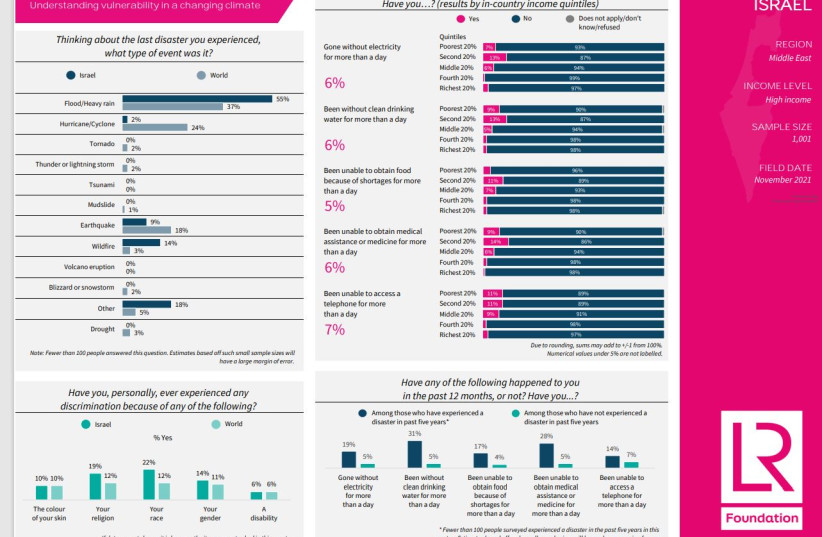Although Israel has many problems ranging from terrorism and wars to crowding and high prices, its populace is more resilient than those in neighboring countries and many others around the world.
Resilience refers to people’s ability to handle the difficulties they face in their lives, wrote the authors of the just-released Lloyd’s Register Foundation Risk Poll, based on surveys conducted by Gallup on 125,911 people in 121 countries and territories across all global regions.
Fifty-five percent of Israelis queried said they worried about floods and heavy rain, compared with a world average of 37%; surprisingly, only 9% worried about earthquakes (even though Israel borders the Great Rift Valley, which historically suffers from tectonic shifts) compared with the world average of 18%.
Fourteen percent were concerned about wildfires, compared with the world average of 3%. Fortunately, Israelis do not have to worry about volcanoes, tsunamis, blizzards, tornadoes, lightning storms or mudslides, and only a tiny minority lose sleep over hurricanes or cyclones.

How do you gauge resilience?
People’s capacity for resilience depends on a range of factors, from individual circumstances to community support and broad societal conditions, the survey outlined. Global hazards like climate change-induced severe weather events and the corona pandemic highlight the need for coordinated action to build resilience among the world’s most vulnerable populations.
The report included charts on what worries Israelis and their resilience compared with other countries in the Middle East and on all six regions including Asia, Africa, Europe, Latin America and the Caribbean, North America and Oceania.
The authors suggest that “global data on the factors underpinning resilience that could be used to build better systems around the world are limited. To respond to this need, the 2021 Lloyd’s Register Foundation World Risk Poll includes a wide range of indicators gauging the ability of people and communities to handle disasters arising from natural hazards and other forms of adversity — including their financial security, social support, access to vital infrastructure and other conditions that combine to form the foundation for resilience.”
Six percent of Israelis said they had gone without electricity for a day or more, had been unable to get clean drinking water for a day or more, or had been unable to get medical assistance or medicine for more than a day. Five percent said they had been unable to obtain food for a day or more because of shortages.
Surprisingly, despite the omnipresence of mobile phones, 7% said they had been unable to access a telephone for more than a day.
One in 10 maintained that they had been discriminated against because of the color of their skin (world average also 10%); 19% because of their religion (12%); 22% “because of their face” (12%), 14% because of their gender (11%); and 6% due to their disability (6% was also the world average).
Israeli resilience
Israelis reported a slightly higher resilience than the world average regarding the individual, household, community and society. Surprisingly, despite our epidemic of elections, when asked whether they thought their government cared about them and their well-being, 46% agreed, compared with a world average of 37%; and 57% said their neighbors cared about them a lot or somewhat, compared with the world average of 66%.
Asked what sources of information they would trust the most to provide information about a possible disaster where they lived, Israelis cited Internet/social media, emergency services, national disaster management, local news and the national weather service.
Only half of the worldwide population (52%) said there is something they could do to protect themselves or their families from a disaster, while 36% said there is nothing they could do, and 6% said “it depends” on the type of disaster.
As for financial security, 34% said they could cover basic needs for less than a month if they lost all their income, including 12% who said they could cover basic needs for less than a week. People in Southern Asia and Northern Africa were most vulnerable in the event of income loss.
Internet access has become a lifeline for people in disaster situations, but people in low-income countries remain far less likely than those in high-income countries to say they have it: 27% versus 91%.
A majority in just 14 of the 121 countries and territories polled said they have a plan all their household members know about in case of a disaster.
Venezuela and Lebanon – two countries facing political crises and economic collapse – were among those where people were most likely to say they were dissatisfied with three key forms of local infrastructure: healthcare, education and road infrastructure.
Worldwide, 12% said they had been discriminated against because of their nationality or ethnic group, 12% because of their religion, and 11% because of their sex.
People in Zambia (52%), Bolivia (49%), Cameroon (49%), Uganda (49%), Brazil (48%) and the US (46%) were most likely to have experienced one or more forms of discrimination.
